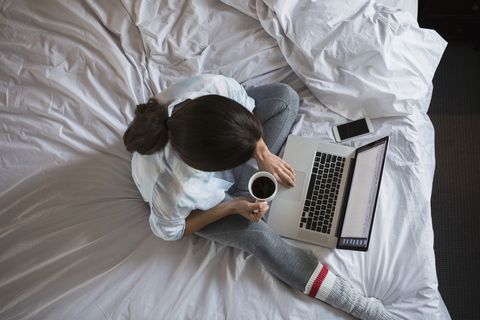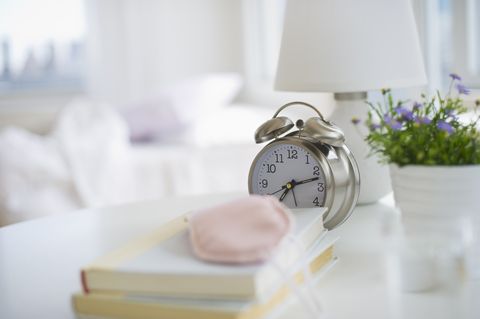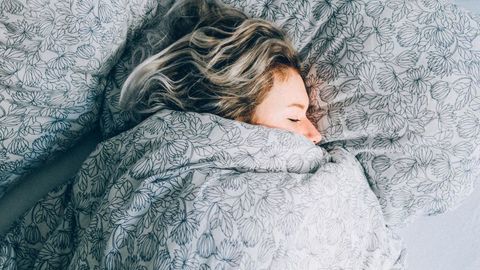Original article is on Cosmopolitan
Sleep is precious. It’s normal for a change in circumstances - noisy housemates, an upcoming work presentation or an overflowing to-do list – to affect your sleep quality. We all occasionally struggle to drift off, or drift off without a problem, only to keep waking up in the middle of the night.
But what if a couple of nights turns into weeks, months, and even years of insomnia? The more you worry about not catching enough Z's, the worse your sleeping habits become and the more it starts to impact on your mental and physical health. According to sleep expert Kathryn Pinkham, “insomnia affects a surprisingly large number of people, in fact around 15 to 30 percent of us can expect to suffer with insomnia at some point in our lives".
It's never too late to regain control of your sleeping habits, and there are some steps you can take to increase the quality of your sleep in the long term. Kathryn is a sleep specialist who founded The Insomnia Clinic - the UK’s largest insomnia specialist service. Here's what we learnt from her evidence-based Cognitive Behavioural Therapy for Insomnia (CBT-i) programme, an NHS-recommended method for long-term treatment of sleep problems that doesn't involve taking medication.
1. KEEP A SLEEP DIARY, BUT DON’T OBSESSIVELY TRACK
Banish sleep trackers and avoid using your phone/watch/Fitbit to monitor your sleep. “They are often inaccurate and only serve to increase anxiety around sleep”, Kathryn says.
2. INTRODUCE SLEEP RESTRICTION
You can train your body to fall asleep at a certain time – with practice. “We are born with the ability to sleep. We just aren’t necessarily born with the ability to know when and how. In order to sleep well, our body clock has to be set to fall asleep at the same time our drive is high. Our body needs to understand how long we want to sleep for, so that clock needs to be set correctly,” Kathryn reveals.
Introducing sleep restriction: limiting the number of hours spent in bed to closely match the time we can sleep for, which creates a stronger drive to fall asleep and improves sleep quality, rather than quantity. “Without that drive, it’s very difficult to sleep well and to fall asleep because essentially there isn’t enough appetite there for it”, she says.
How to calculate your sleep restriction window:
- First, work out your sleep efficiency - how long you’re asleep for vs how long you spend in bed in total – by dividing your sleep time by the amount of time you spend in bed in total and times by 100. For example, 6 hours of sleep / 8 hours in bed x 100 = 75%.
- This gives you the percentage of time you’re actually asleep, and the remaining 25% is how much you will reduce your sleep window by. For example, your new sleep window would be 12am – 6am, spending 6 hours in bed for 6-hour sleep, rather than 8 hours in bed for a 6-hour sleep.
“Sleep restriction is creating a much stronger drive to actually fall asleep simply by creating a mild sleep deprivation”, Kathryn adds. The insomnia expert notes that this is only a short-term step: “It’s a way of fixing the problem that has been created, and in the long term, things will get much better.
3. DON’T WASTE TIME IN BED NOT SLEEPING
Kathryn recommends being super strict with your sleep window - however tired you are, stay awake until your new bedtime when your sleep drive should be high.
4. DISSOCIATE YOUR BEDROOM FROM WAKEFUL ACTIVITIES
We’re all guilty of using our laptops to watch Netflix in bed or having a cheeky midnight scroll through Instagram, but Kathryn believes that “the more we associate our bed with wakeful activities, the poorer the connection we have to sleep”.
Instead, she recommends correcting our drive by associating our bed with its sole purpose – getting some shut eye. To do so, we need to disconnect our bedroom from activities like watching TV, using our phones, working or lying awake for hours feeling frustrated or anxious.
“If you are wide awake and feeling frustrated, leave the bedroom and do something unstimulating until you feel tired,” Kathryn suggests. Have a warm bath, read a book or listen to some calming music, only going back to bed when you feel sleepy. “The more times we fall asleep quickly and sleep through, the less anxiety we have about sleeping, and the more we connect our bed to sleeping and the better our sleep pattern becomes”, explains Kathryn.
5. FIND WAYS TO MANAGE ANXIOUS THOUGHTS
Sleep = a drop in core temperature + a drop in heart rate, so anxiety is sleep's enemy because it sends a ‘fight or flight’ message and makes you feel hotter and more vigilant with a faster heart rate. “You are creating an environment which would be impossible to sleep in”, Kathryn says.
De-stressing before bedtime is easier said than done, particularly if you worry a lot about getting a good night's sleep. However, the insomnia specialist suggests trying this experiment to ‘postpone’ anxious thoughts rather than trying (and failing) to suppress them: “Every day for 20 minutes, write down your thoughts around sleep or anything else you’re worried about. Close your notepad and go do something else – watch TV, read a book, do something you enjoy. Whenever something pops into your head, acknowledge it, make a note of it, and when you come to your allotted 20-minute time slot that night, write it down and start looking at it and working out how you feel about it. This is all about getting it out of your head and onto paper to get a different perspective. We’re not suppressing worries; we’re just deciding when to think about it.”
If you think that your anxious thoughts are affecting your quality of life and may be a sign of a mental health issue, speak to your doctor.
6. AVOID LOOKING AT THE CLOCK
Are you guilty of checking the time if you wake in the middle of the night to calculate how many hours you have before you have to get up? Us too, but it's important to resist this temptation.
“There’s very little to be gained by looking at the clock in terms of anxiety levels", Kathryn says. "It makes your heart and brain start racing because you’re thinking of all the things you need to do and how you’re not going to be refreshed enough.”
7. HAVE A HEALTHY, ACTIVE DAYTIME ROUTINE
Kathryn’s motto? “Leave the daytime for living and the night time for sleeping”. It's important to get lots of sunlight early on in the day, as well as fresh air, exercise and water – the more routine you have in your daytime, the better your routine is going to work at night. She also recommends sticking to eating and drinking during the day as you don’t want to be in the routine of eating close to bedtime or waking up and eating during the night.
If you're desperate for a daytime nap, Kathryn suggests resting for “no longer than 20 minutes and no later than 3pm.” A consistent routine also means no marathon lie-ins on the weekend... sorry!
8. PRACTICE GOOD SLEEP HYGIENE
Creating a nice environment for a good night’s sleep is often overlooked but definitely important – an uncluttered room, a comfy mattress, low lighting, a cool temperature, and yep, even earplugs for snoring partners or noisy neighbours.
Kathryn also recommends avoiding caffeine after 4pm and trying not to use your phone and laptop for 2 hours before bedtime, as they will stimulate the hormones that keep you awake (maybe pick up a copy of Cosmo instead, eh?). Although it’s important to be mindful of these things, they “will improve sleep but the reality is that they are not cures for a sleep problem”, Kathryn adds. If you obey the strictest sleep hygiene but still sleep poorly, it could be that “you’re thinking too much about it and doing too many things to try and make it work”.
9. REALISE THAT A GOOD NIGHT’S SLEEP IS IMPORTANT, BUT IT ISN’T EVERYTHING
Your quality of sleep isn’t in control of your life. “Everyone out there who sleeps 8 hours a night doesn’t have a perfect life, they don’t perform perfectly at work, they don’t ever not make a mistake. Sleep is not going to fix all of those things”, Kathryn says.
We have to acknowledge that if our lifestyle is stressful and makes us anxious, this is going to make us tired, even if we’ve had enough sleep. “The worry is exhausting. So, even if you’re sleeping better but you still feel tired all the time during the day, that is because stress is exhausting. If I get 10 hours sleep a night but I’m stressed during the day, then I’ll still feel exhausted. That’s because it’s my body’s way of letting me know I’m not ok and I need to do something about it,” she says.
10. DON’T THINK NEGATIVELY ABOUT SLEEP
Don’t turn sleep into something you’re 'succeeding' or 'failing' at. “Most of us are blaming sleep for all the things we’re not feeling, achieving or doing”, Kathryn says. “People who aren’t sleeping well have this idea that ‘if I could sleep well, everything would change, and I’d be a better person’. The reality is that people who sleep well don’t always wake up bounding with energy, never make mistakes and are better versions of themselves. That’s not the case.”
Kathryn adds that while good quality sleep is important (for memory, productivity and concentration), it isn’t as important as people who aren’t sleeping well think: “We put lots of emphasis on how we would be if we slept more when in reality, sleep really only makes us tired. All these other worries we have are actually the result of worrying about sleep”.
Kathryn Pinkham is a sleep expert at The Insomnia Clinic.


 +1 305 627 3755
+1 305 627 3755




